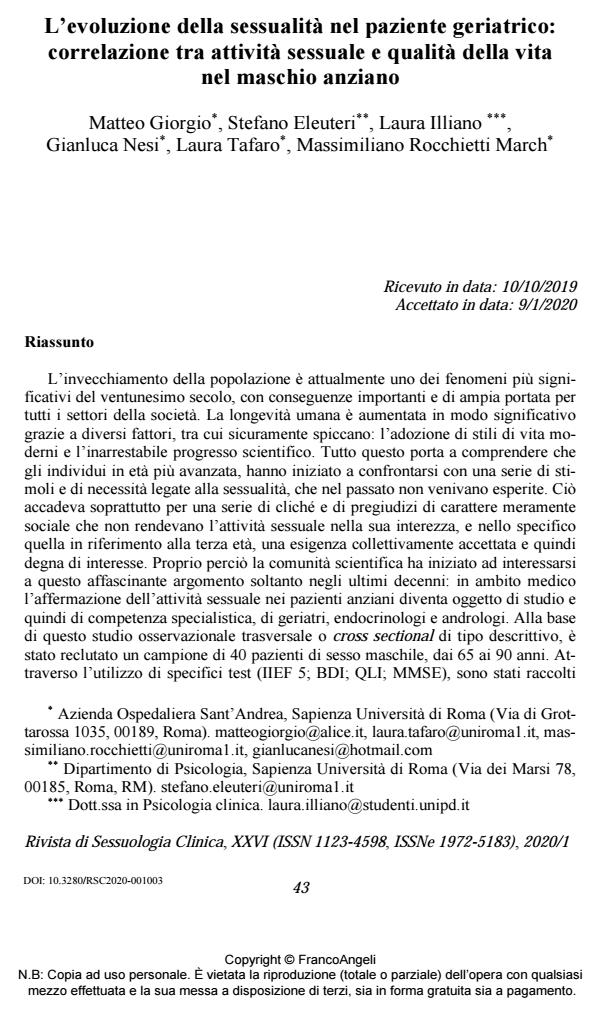The evolution of sexuality in geriatric patients: A correlation between sexual ac-tivity and quality of life in the aging male
Journal title RIVISTA DI SESSUOLOGIA CLINICA
Author/s Matteo Giorgio, Stefano Eleuteri, Laura Illiano, GianlucaNesi, Laura Tafaro, Massimiliano Rocchietti March
Publishing Year 2020 Issue 2020/1
Language Italian Pages 20 P. 43-62 File size 756 KB
DOI 10.3280/RSC2020-001003
DOI is like a bar code for intellectual property: to have more infomation
click here
Below, you can see the article first page
If you want to buy this article in PDF format, you can do it, following the instructions to buy download credits

FrancoAngeli is member of Publishers International Linking Association, Inc (PILA), a not-for-profit association which run the CrossRef service enabling links to and from online scholarly content.
Population’s aging is currently one of the most significant phenomenon in the XXI century, with very important consequences in every section of society. Human longevity has grown in a significant way thanks to differents factors: the meaningful ones are surely the adoption of modern lifestyles and the unstoppable scientific progress. All these factors bring to the conception that old people are fac-ing up to new sets of stimuli and necessities connected to sexuality; something that they would not have experienced in the past. This happened especially for a series of social cliché and prejudices which made old people’s sexuality not accepted by the community and not so interesting. Precisely for this, scientific community has started studying this fascinating theme only in the last few years. In medicine, the rising of sexual activity for old subjects has become a specific focus for geriatrisci-ans, endocrinologists, and andrologists. It has been shown that desire does not dis-appear in old age: also sexual arousal and orgasmic capacity persist. In old age, therefore, sexuality continues to be present, even if the ways and conditions through which it manifests and expresses itself are different. The factors modify-ing the sexual response of the elderly male can be biological (e.g. erectile dysfunc-tion, frequently caused by arterial pathologies that affect especially elderly men with hypercholesterolemia, diabetes, peripheral vasculopathy or hypertension, as well as smokers), psychosocial (e.g. lack of available partners, isolation from the active community, and other factors that feed the stereotype of the tired and inactive old man), and/or psychological (individual variability, life experiences, intro-jected taboo and stereotypes about older sexuality, attitude towards body chang-es, etc.). In this descriptive cross-sectional study, we recruited 40 male subjects between 65 and 90 years old. Subjects with clinical diagnosis affecting sexuality were excluded from the sample (i.e. patients undergoing pelvic surgery or radiotherapy; suffering from hypogonadism or hyperprolactinemia; affected by cognitive deficit or mood disorder). Through the employment of specific tests: International Index of Erectile Function (IIEF 5); Beck Depression Inventory (BDI); Quality of Life Index (QLI) and Mini-Mental State Examination (MMSE), we collected data re-ferred to some aspects: sexual function, cognitive state, mood, and general quality of life. Data have been elaborated with a descriptive and an inferential statistic analysis (linear and multiple regression). The aim of the study was to verify a pos-sible relationship between presence/absence of sexual behaviour and individual’s quality of life. We would like to stimulate a major interest in old subjects’ needs in order to mantain and promote a long-life sexual health. Only through the spread of a new sensibility, towards these issues, it will be possible to promote the right of an affective and sexual health, without chronological limits, and to promote a sat-isfactory quality of life in elderly person on the physical, psychological and rela-tional level, strengthening the concept of health itself. Positive and significant rela-tions emerged, with both BDI and IIEF5 scores predicting QLI scores. Multiple re-gression models found that each score of BDI contribute to a diminution of 0.29 in the QLI score, while each score in the IIEF5 contribute to an increase of 0.13 in QLI score. IIEF5 scores has been found to increase QLI score in elderly men. An higher quality of life is recorded in patients who still benefit from a satisfying sex-ual activity; at the same time the quality of life is reduced in subjects with a de-creased mood tone, probably linked to a decline in sexual function. When the sex-ual function remains conserved, other important domains will be preserved, lot of them are important into the framework of global wellbeing. The conservation of a good sexual practice affects the elderly males’ life, in a multifactorial way: from biological to psychosocial aspects.
Keywords: Sexuality, Old man, Affectivity, Quality of life
Matteo Giorgio, Stefano Eleuteri, Laura Illiano, GianlucaNesi, Laura Tafaro, Massimiliano Rocchietti March, L’evoluzione della sessualità nel paziente geriatrico: correlazione tra attività sessuale e qualità della vita nel maschio anziano in "RIVISTA DI SESSUOLOGIA CLINICA" 1/2020, pp 43-62, DOI: 10.3280/RSC2020-001003